New Generation Automotive PVC Skin Compound: A Special Focus on Plasticizer Migration
Abstract
Plasticizer migration from Polyvinylchloride (PVC) skin compounds to Polyurethane (PU) foam has always been an undesirable phenomenon causing increased embrittlement, dimensional instability leading to loss of soft touch functionality and appearance deficiencies in automotive interior applications. Traditional approaches to prevent defects from migration are to utilize more expensive non-PVC materials for instrument panel or door panel skins or in the case of injection molded skins to introduce barrier material between PVC/PU foam layers. Automotive Original Equipment Manufacturers (OEM) wish to avoid use of these more expensive methods due to associated material and operation costs owing to multi-step operation. There has been a growing interest among OEM’s to find alternative materials with minimum plasticizer migration and robust test procedures that can help in material selection process. Recognizing this trend, Mitsubishi Chemical Performance Polymers (MCPP) developed a new class of PVC grades specifically designed to prevent unwanted plasticizer migration which provides the appearance and performance benefits of more expensive non-PVC materials at the cost of a traditional PVC solution. Presented here is an introduction to the mechanics of the plasticizer migration, a comparative analysis of plasticizer migration between the new generation of advanced PVC skin compound and a standard PVC skin compound and performance of the material in automotive interior applications.
About the Speaker
Nischay Shivaprakash, PhD, received his Ph.D degree in Plastics Engineering from Umass Lowell. He joined MCPP in 2019 as an R&D Formulation Chemist where his research is focused on TPV and TPE material development for automotive applications. His areas of expertise include polymer formulation development surface engineering for tailored wettability and advanced polymer processing.
Raf Bussels, PhD, is the Chief Technology Officer of MCPP Netherlands responsible for PVC slush molding business and material development for 3D printing application. Prior to joiningMCPP he has experience of working in various R&D positions along the plastics industry vertical. He holds a PhD in Polymer Chemistry from Eindhoven University of Technology and has authored numerous publications and patents.




























